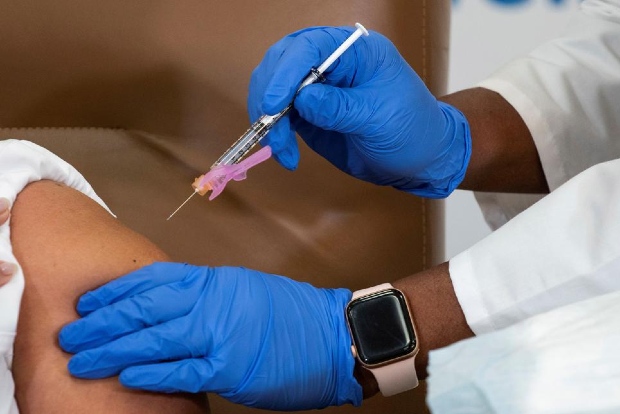Begin typing your search...
'Arbitrary, irrational': SC on Centre's vax policy for 18-44 yrs
The Supreme Court on Wednesday made scathing remarks on Centre's vaccination policy against Covid-19, terming the replacement of free vaccination in the first two phases with paid vaccination for persons between 18-44 years as prima facie as "arbitrary and irrational".

New Delhi
In a 32-page ruling, a bench comprising Justices D.Y. Chandrachud, L. Nageswara Rao and S. Ravindra Bhat said: "Due to the importance of vaccinating individuals in the 18-44 age group, the policy of the Central government for conducting free vaccination themselves for groups under the first 2 phases, and replacing it with paid vaccination by the state/UT governments and private hospitals for the persons between 18-44 years is, prima facie, arbitrary and irrational."
The court noted that persons between 18-44 years of age have not only been infected by Covid-19 but have also suffered from severe effects of the infection, including prolonged hospitalisation and, in unfortunate cases, death.
"Due to the changing nature of the pandemic, we are now faced with a situation where the 18-44 age group also needs to be vaccinated, although priority may be retained between different age groups on a scientific basis," it said.
Healthcare workers (HCWs), frontline workers (FLWs) and persons above the age of 45 years, were prioritised in Phases 1 and 2 for obtaining Covid-19 vaccines. The vaccination policy was substantially changed for persons between 18-44 years of age.
The liberalised vaccination policy requires some of these persons to pay for the vaccines, limited vaccines were made available for this category with the state/UT governments/private hospitals, and an additional requirement of mandatory digital registration through CoWIN.
The top court noted vaccination of the nation's entire eligible population is the singular most important task in effectively combating the pandemic in the long run.
Citing issues with vaccination policy, the amicus curiae, in the matter, said states and municipal bodies unsuccessfully negotiated with foreign manufacturers to procure vaccines and the Centre is better placed to use its monopoly as a buyer to bargain for higher quantities of vaccines at reasonable prices.
"We find that the submissions urged by the Amici are extremely pertinent and have indicated that in practice, the liberalised vaccination policy may not be able to yield the desired results of spurring competitive prices and higher quantities of vaccines," the bench noted.
The Centre said the Union Budget for financial year 2021-2022 had earmarked Rs 3,5000 crore for procuring vaccines. However, the top court said in light of the liberalised vaccination policy, the Centre is directed to clarify how these funds have been spent so far and why they cannot be utilised for vaccinating persons aged 18-44 years.
Justifying its intervention on vaccine policy, the top court said judicial review and soliciting constitutional justification for policies formulated by the executive is an essential function, which the courts are entrusted to perform. "Our Constitution does not envisage courts to be silent spectators when constitutional rights of citizens are infringed by executive policies," it said.
The top court added that the current vaccine policy enables state/UT governments and private hospitals to procure 50 percent of the monthly Central Drugs Laboratory approved doses in the country at a pre-fixed price.
"The justification for this policy has been adduced in a bid to spur competition which would attract more private manufacturers that could eventually drive down prices. Prima facie, the only room for negotiation with the two vaccine manufacturers (Bharat Biotech and Serum Insititute of India) was on price and quantity, both of which have been pre-fixed by the Central government. This casts serious doubts on UoI's justification for enabling higher prices as a competitive measure," it said.
The bench contended that if the Centre's unique monopolistic buyer position is the only reason for it receiving vaccines at a much lower rate from manufacturers, it is important for the court to examine the rationality of the existing liberalised vaccination policy against Article 14 of the Constitution, since it could place severe burdens, particularly on states/UTs suffering from financial distress.
The judgment was passed in the suo motu case initiated by top court to deal with issues relating to Covid-19 management in the country. On May 31, the Supreme Court had shot a volley of tough questions at Centre in connection with its Covid vaccine policy, and flagged various flaws: shortage of vaccine doses, pricing issues, registration for vaccination, and lack of vaccine, especially for the rural areas in the country.
Visit news.dtnext.in to explore our interactive epaper!
Download the DT Next app for more exciting features!
Click here for iOS
Click here for Android
Next Story



